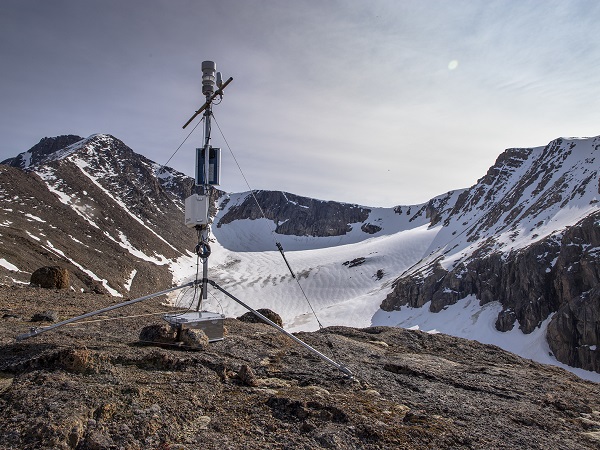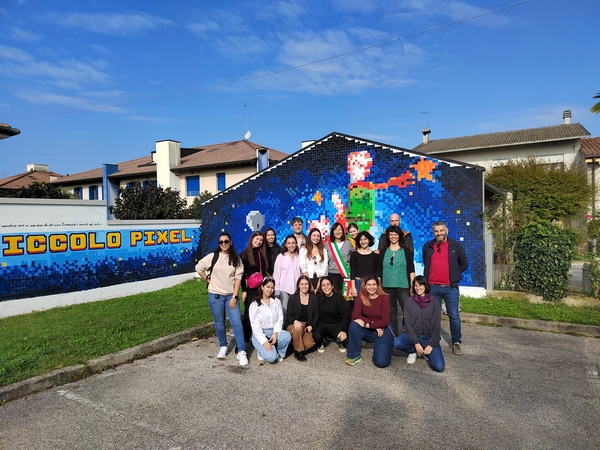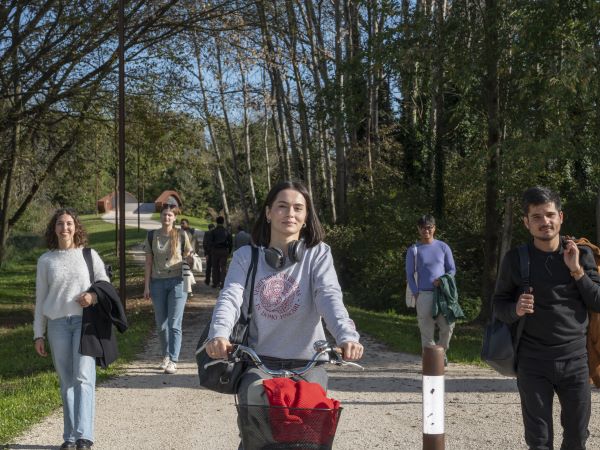Podcasts have become an essential tool for connecting citizens with institutions. The European Parliament has adopted this innovative format to communicate its legislative activities, policies, and decisions that impact millions of European citizens in a more direct and engaging manner.
Vera Buffolo, a Ca’ Foscari alumna, is part of the production team of Europarl Radio, the European Parliament's official web radio, which creates and broadcasts original audio content daily in all 24 official languages of the European Union.
Vera's academic journey began at Ca’ Foscari University, where she earned a Bachelor's degree in Language, Civilisation, and the Science of Language, with a specialization in German and Spanish. She then pursued a Master's degree at the University of Modena and Reggio Emilia, again focusing on languages.
In 2019, she began her international career at the European Parliament, where she was selected for a Schuman traineeship in what was then a new unit, the Audio Capacity Service, within the Directorate-General for Translation in Luxembourg. After five years of experience as a podcast producer, we asked this former Ca’ Foscari student to share the rewards and challenges of her work.
What kind of radio programmes does the European Parliament produce?
Europarl Radio produces daily podcasts, translated and recorded in all 24 official EU languages, plus Ukrainian. Our flagship product is News in Brief, a daily news bulletin lasting just a few minutes, keeping you informed about the latest updates from the Parliament and the Union. We also offer series that delve deeper into the themes and initiatives of the European Parliament. Among these, Raising the Game: Better Legislation examines laws and decrees discussed during plenary sessions or 'hot topics' such as AI regulation or the Media Freedom Act, explaining them in a simple and comprehensive way. My favourite series is "Europe and Me", which provides updates on initiatives that support democracy and human rights. In the latest episode, we discuss María Corina Machado and Edmundo González Urrutia, the winners of this year’s Sakharov Prize for Freedom of Thought. We also have several historical-themed series where we explore key figures and significant events that have shaped the history of the European Union. For example, in the "My Story" series, we delve into Europe’s past through the testimonies of ordinary people sharing how their lives intersected with major historical events, such as the Second World War and the Romanian Revolution. You can find this content and more on our website, as well as on the Europarl Radio app, Spotify, and Apple Podcasts.
Can you describe a typical day for an Audiovisual Producer?
Working at the European Parliament is both intriguing and varied; it allows me to connect with people from all over Europe, from Estonia to Portugal. My typical day might begin with listening to and editing a podcast in Hungarian, and then end with writing the script for the next English podcast, which will be translated and recorded in all the other languages. There may also be meetings focused on improving the Europarl Radio platform to provide users with an even more engaging experience. Together with my colleagues in translation, we often discuss how to write clear texts and communicate effectively with our audience. My work encompasses several areas—it’s not just about communication or translation; it’s a hybrid role.
What I enjoy most about my job is the opportunity to always create something new. There is a strong need to establish direct connections with citizens and develop new tools to facilitate this. Designing these connections—whether through organising live radio broadcasts, collaborating with a network of national radio stations like Radio Ca’ Foscari, or creating content for social media—is very exciting.
What are the biggest challenges in producing podcasts for an institution like the European Parliament?
The key question we are constantly trying to answer, and on which we strive to improve, is how to make the topics we cover and our podcasts engaging and interesting for our audience, particularly younger listeners. First and foremost, it is essential that the speaker has a genuine interest in the topic being discussed; a deep understanding of the subject is crucial. Additionally, finding the right approach to present everything in a captivating and engaging way is equally important.
When I write a podcast, I like to think I am taking the listener on an adventure akin to an epic film journey, much like "The Lord of the Rings," which is my favourite. The narrative begins by introducing the context and characters while unveiling the mission. As the story progresses, we encounter challenges and obstacles. Along the way, surprises and achievements arise, culminating in a finale that sometimes leaves an open-ended conclusion. This storytelling approach is not only effective for narrating a quest for a ring, but it can also be applied to recount the lives of significant figures, such as Louise Weiss, a pioneer of the European Union, or milestones like the European Media Freedom Act. Each story features characters, a problem to solve, and challenges that, at times, seem insurmountable. Yet, storytelling will always remain relevant; regardless of the era, people have an innate desire to listen, provided the story is well told.
What do you see as the future of your podcasts with the rise of AI in content production?
Every morning on Europarl Radio, you’ll find News in Brief, the European Parliament’s audio news bulletin available in the 24 official EU languages and in Ukrainian. Imagine if AI were to write, translate, and edit the content. What a time-saver that would be! Europarl Radio exists to communicate the European Parliament, offering accurate, reliable, verified, and constantly updated information. Furthermore, our team of translators, tasked with translating and recording this content, is among the best in the field. This ensures a quality that AI, no matter how advanced, is not yet capable of matching. However, we are always mindful of technological developments and are exploring innovative solutions while remaining aware of the specificity and importance of the service we provide.
What memories do you have of your time at Ca’ Foscari?
Ca’ Foscari provided me with an excellent academic and linguistic foundation, and it will always hold a special place in my heart. Here in Luxembourg, I still use the bag with the Ca’ Foscari logo. I remember with gratitude many professors who inspired me and contributed to my education. I also cherish the memories of days spent in Venice, including the amusing mishaps of having wet socks from the acqua alta!
One of the most rewarding experiences I had thanks to Ca’ Foscari was participating in the Erasmus+ programme. The university's numerous international connections made it easy for me to spend a study period in Frankfurt. This experience set me on the path to where I am now; it was the first moment I realised I wanted to pursue an international career.
What are the three values that guide you?
Honesty: Being truthful with yourself and with your colleagues is essential. It’s the first step toward communicating sincerely with your audience, which is reflected in your writing and creative work.
Flexibility: In our diverse environment—culturally and otherwise—flexibility is crucial. Although English serves as our common language, the essence of our interactions is deeply influenced by the varied cultures we represent.
Rigour: It is important to take your work seriously and pay attention to details, consistently striving for improvement.










